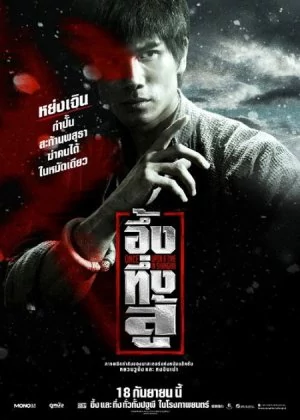Once Upon a Time in Shanghai

Remakes. Often cited as a sign of the times, but they've been ever-present throughout the history of cinema. So how do you do one properly? Well, you get a good director, hire a proficient cinematographer, make sure you have enough acting talent and familiar names to drape across your poster and you keep it familiar enough as to not alienate your core audience. Extra credit for starting off your title with 'Once Upon', meaning you're pretty much set up for success. And that's exactly how Once Upon a Time in Shanghai [E Zhan], the remake of Boxer from Shantung, came to be.

Hong Kong has a severe martial arts problem. Donnie Yen is unable to replace Jet Li as martial arts overlord, there's an over-reliance on sketchy CG to spruce up the big productions and ever since the first-rate directors have abandoned the genre there's been no one to truly take over the reigns. Producers Wai-Keung Lau and Jing Wong set out to turn things around. They brought together a pretty amazing team, giving it their all to try and revive the glory days of the Hong Kong martial art business.
Attracting Ching-Po Wong (Fuk Sau Che Chi Sei) to direct the project was a pretty gutsy move. Even though he's an incredibly talented director, Wong lacks real experience when it comes to bringing martial arts wizardry to the big screen. He's more at easy directing off-kilter crime and drama films, so to offset that short-coming Woo-ping Yuen (Su Qi-Er) was brought on board. Yuen is one of the most legendary martial arts choreographers/directors ever to work in Hong Kong and a near-guarantee that at least the action scenes will leave you mesmerized.
Even though the film is a retelling of a popular Chinese tale (based on real-life boxer Ma Wing-Jing), this could've easily been a more generic martial arts story. It's a simple tale about a poor chap arriving in Shanghai and taking the city by storm. Rise and fall, vintage Once Upon material. Apart from producing, Jing Wong also wrote the screenplay, which explains why it's quite short, fast-paced and a little ill-focused. Then again Once Upon a Time in Shanghai never even tries to be really epic or deep.

Shot entirely in not-quite black and white, the cinematography is one of the highlights of the film. Jimmy Wong (Fuk Sau Che Chi Sei) has become Wong's cinematographer of choice, lending his films the proper visual prowess. The martial arts scenes in particular jump out. They did go a little overboard on the speed-ups, but apart from that the fight sequences are extremely dynamic, complex and hard-hitting. It's been a while since I've been this impressed by fight choreography and cinematography, so that's saying something.
The soundtrack is an amusing romp, though mostly functional. Except for the scenes in the night club, where some really nice vintage-sounding Chinese songs help to establish the mood. It's in these moments that the film reveals its Wai-keung Lau inlfuences (just watch Jing Wu Feng Yun: Chen Zhen). All in all it's a pretty accomplished soundtrack, nothing too out of the ordinary but not as invisible as is usually the case with martial arts films.
Taking up the lead role is Philip Ng. He's far from the best actor around and he has a rather goofy air hanging over him, but he's an excellent martial artist and he managed to use his weaknesses to his advantage here. He is something of a modern day Bruce Lee, which is a perfect fit for his character. Andy On is a reliable adversary, former martial arts legends Sammo Hung and Kuan Tai Chen (lead actor in the original film) complete a solid cast.

It's one thing to gather a talented crew, keeping everyone in check in order to create a sensible whole is quite something else. Once Upon a Time in China is definitely not without fault, it's no Yip Man where every little detail is part of a greater vision. But it knows it isn't and instead it tries to be something different, something new. Rather than perfect what's already there, the film aims to deliver a fresh, novel take on the genre. And in that it succeeds.
Jing Wong, Wai-keung Lau, Ching-Po Wong, Jimmy Wong, Woo-ping Yuen and Philip Ng gave it their best shot. The result is a little uneven, but the positives far outweigh the negatives. Everyone with a soft spot for martial arts cinema would do good to give Wong's latest offering a shot. Not everyone may appreciate the modern spin they've added, but between the stunning cinematography, the impressive fight scenes and the fast-paced plot it's hard not to like at least some part of Once Upon a Time in Shanghai.